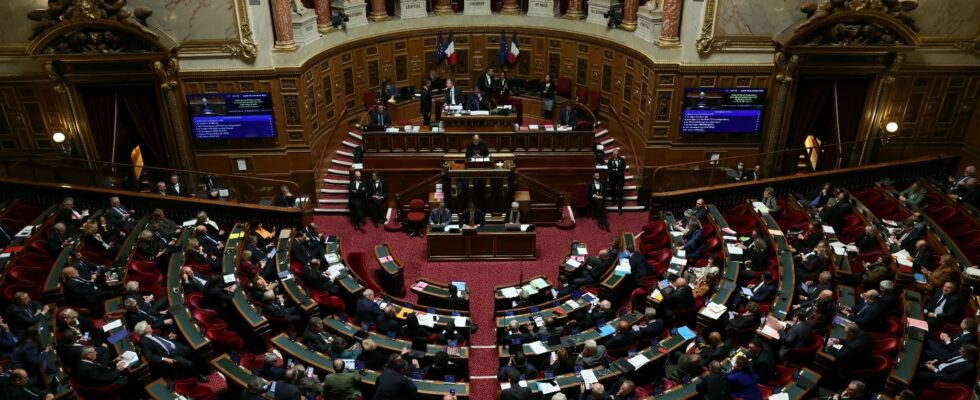An exceptional effort required of large companies and the richest, dried up state spending: the budget submitted this Thursday, January 23 to the Senate vote remains close to Michel Barnier’s project, but it could be reworked in the coming days to resist censorship. On this finance bill for 2025, François Bayrou chose to resume parliamentary debates where they left off at the time of the Barnier government’s censorship. The option saves time, but it has a direct consequence: the version submitted to senators on Thursday (2:30 p.m.) is that of the previous executive. The election therefore promises to be without suspense for a government which is still seeking to negotiate its survival with the socialists.
The text therefore includes most of the measures announced in the fall, such as the temporary effort on income tax for the wealthiest households (2 billion euros hoped for) and the “exceptional contribution” on the profits of large companies (8 billion). Other proposals included in this budget: an increased penalty on the purchase of thermal cars, increased taxation on plane tickets and gas boilers or even an exceptional tax on the CMA-CGM shipowner.
The possibility for the government to increase taxation on electricity beyond its pre-energy crisis level, once considered by Michel Barnier but abandoned to give assurances to the National Rally, has on the other hand been deleted from the text . An orientation since confirmed by the new Prime Minister, François Bayrou.
An almost insoluble equation
If the finance bill was rejected by the Assembly without even completing its examination in the fall, the Senate for its part studied it in full between November and January. That is several dozen hours spent in the hemicycle with two successive governments. Even if it was on another budgetary text, the Social Security budget, that the Barnier government was overthrown, there is no guarantee that the oppositions will let this PLF pass without batting an eye, quite the contrary. Crucial for the proper functioning of the State which is currently slowing down under the exceptional regime of a special law passed at the end of the year, this budget represents an almost insoluble equation for the executive, deprived of an absolute majority in the National Assembly but ordered by Brussels to straighten out public finances.
Dominated by a right-centrist alliance that supports the government, the upper house approved most of the proposals, but it also left its trademark mark. The financial effort requested from local authorities was thus reduced from 5 to around 2.2 billion euros in the senatorial copy, a choice since validated by François Bayrou. Above all, the major maneuvers have begun in the part dedicated to state expenditure, examined in recent days. On this aspect, the current government, which is aiming for 32 billion savings, has already been able to present several budget cuts. The vast majority of ministries are concerned, with plans often costing several hundred million euros: development aid, ecology, MaPrimeRénov, culture, and even sport, which Emmanuel Macron himself criticized six months later the Olympics.
Rare exception: the Overseas budget was revalued compared to the “Barnier copy”, notably due to the credits necessary for launching the reconstruction of Mayotte. The Senate also marked its priorities by proposing some flagship and criticized measures: elimination of the Organic Agency and the Universal National Service (SNU), reduction of State Medical Aid for urgent care of undocumented immigrants, etc.
“The CMP will be the justice of the peace”
The debates on the budget are far from over after the vote in the Senate, which should adopt the text without difficulty. The government will in fact ask parliamentarians from both chambers to try to agree on a common version on January 30 during a joint committee (CMP). “The CMP will be the justice of the peace. Between now and January 30, there is the possibility of moving the lines. The budget will not be good, we know that, but we want it to be as bad as possible,” the president of the PS senators Patrick Kanner told AFP, who is calling for further progress.
It is in this closed-door conclave, with only seven deputies and seven senators around the table, that final arbitrations can be integrated into the copy: a decisive moment to arrive at a version likely to resist the censorship of the National Assembly. Thus, the concessions recently granted by François Bayrou to the Socialist Party in exchange for non-censorship risk appearing at this stage, such as for example the renunciation of the elimination of 4,000 teaching positions (rejected overnight by the LR senators, as well as the restoration of 500 positions for France Travail and the creation of 924 positions for the Ministry of Justice). But the room for maneuver is limited: due to constitutional rules, any new measure without a direct link to the text under discussion will be declared inadmissible.
If this CMP is conclusive, the common text will be submitted to both chambers during the week of February 3 for a final vote without the possibility of amendment… With, perhaps, the use of the first 49.3 of François Bayrou to avoid a rejection, undoubtedly followed by a new motion of censure. The deputies will also examine the draft budget for Social Security, another high-risk text for the government: it is this one that Michel Barnier came across.
